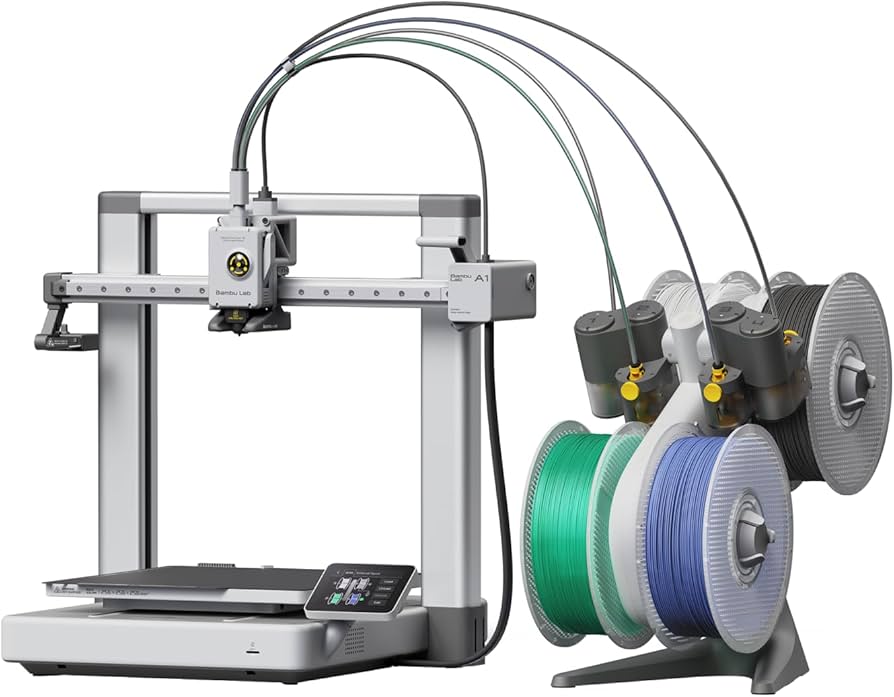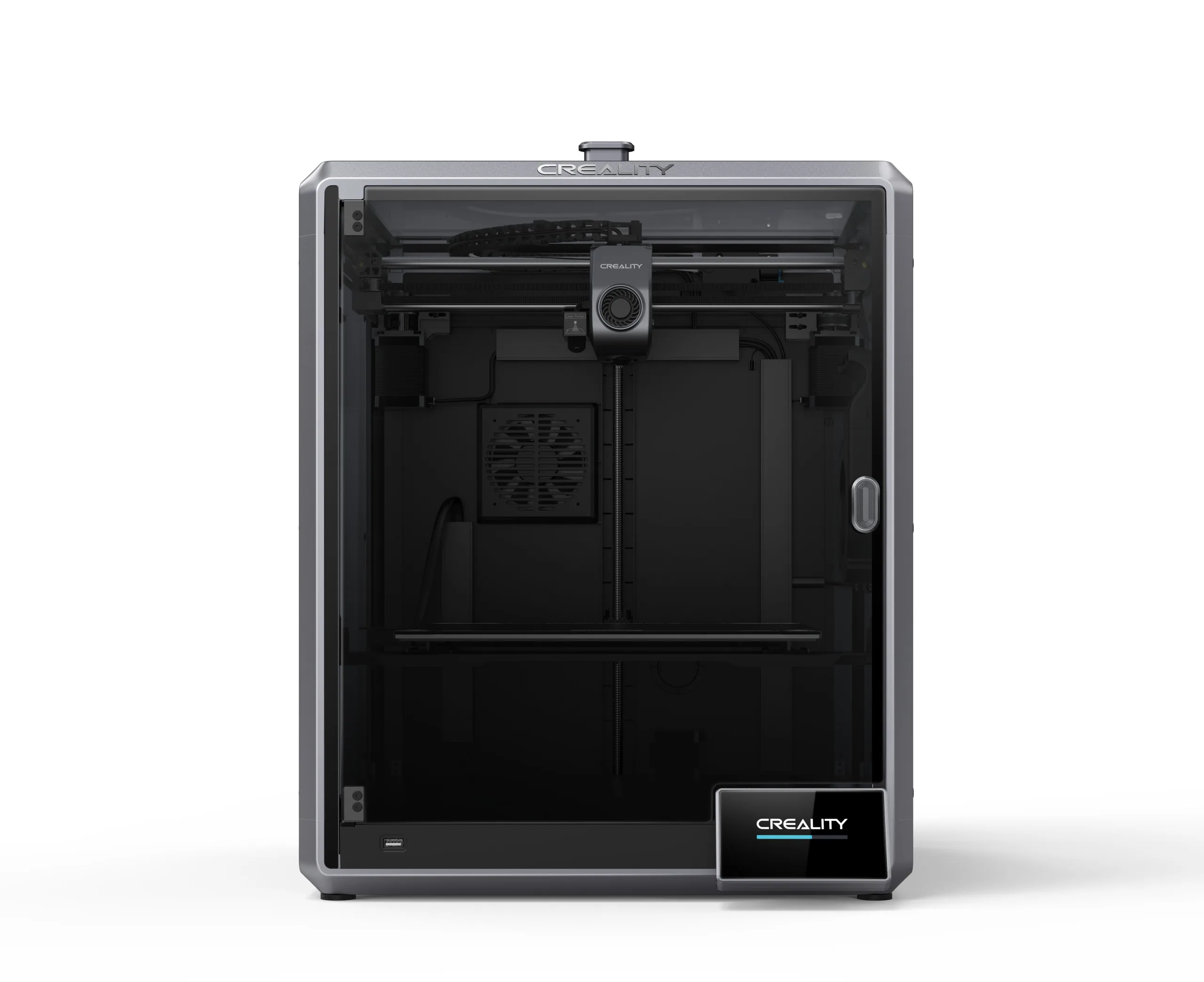Compare A1 vs K1 Max
Comparison between the best 3D printers
Choose the best 3D printer at the best price. The cheapest 3D printers are here.
Buy a 3D printer here with 3D Fila.
 |
 |
|
| Model | A1[BUY A1] |
K1 Max[BUY K1 Max] |
| Printing Material | Filament | Filament |
| Buy Filament for Bambu Lab A1 | Buy Filament forCreality 3D K1 Max | |
| Estimated price | $700,00 | $1300,00 |
| Manufacturer | Bambu Lab | Creality 3D |
| Release Year | 2023 | 2023 |
| Print Volume [mm] | 256x256x256 | 300x300x300 |
| Printer Size [mm] | 385x410x430 | 435x462x526 |
| Weight [kg] | 8,3 | 18 |
| Power Loss Recovery | YES | YES |
| Enclosed printer | NO | YES |
| Bed Leveling | Automatic | Automatic |
| Filament End Sensor | YES | YES |
| Bed type | Heated | Heated |
| Power supply system | Direct Drive | Direct Drive |
| Standard nozzle | 0,4 | 0,4 |
| Maximum Nozzle Temperature [°C] | 300 | 300 |
| Maximum Bed Temperature [°C] | 100 | 100 |
| Maximum printing speed [mm/s] | 500 | 600 |
| Filament holder | YES | YES |
| Camera for supervision | YES | YES |
| Recommended filaments | PLA, PETG, TPU, PVA | ABS, PLA, PETG, TPU, PA, ASA, PC, PLA-CF, PA-CF, PET-CF |
| Recommended slicers | SuperSlicer, PrusaSlicer, Cura, OrcaSlicer | Creality Print, Cura, Simplify, Slic3r, IdeaMaker e outros |
| Maximum Resolution [mm] | 0,1 | 0,1 |
| Processor | ||
| Display | Touchscreen 3,5 | Display touchscreen 4,3'' |
| Power Supply | 350 W | |
| Connectivity | Wi-Fi, Bambu-Bus, Cartão Micro SD | USB / Wi-Fi / Ethernet |
| Operating systems | Windows, Linux, Macbook | Windows, Mac, Linux |
| Date of registration in the system | 2024-07-17 | 2023-12-01 |
| Release date | 2023 | 2023 |
| Extra features | The BambuLab A1 printer features fully automatic calibration, multi-color printing with the AMS system, active flow rate compensation, quick nozzle change with a clip, active motor noise cancellation, a build volume of 256x256x256 mm³, a maximum extruder temperature of 300°C, and a heated bed of up to 100°C. In addition, it has high precision, a machine health management system and an intuitive 3.5-inch touchscreen interface. | The Creality K1 Max stands out as a fast Core XY 3D printer with a large build volume of 300 x 300 x 300 mm. It is fully enclosed and equipped with AI sensors to prevent print failures. This model has a smooth and flexible PEI build platform, and uses an automatic leveling system with LIDAR, as well as a filament run-out sensor. LAN, Creality Cloud and USB Flash Disk connectivity are available, as well as a 4.3-inch touchscreen interface. The K1 Max is robust, weighing in at 18 kg, and includes an AI camera and limited version of the Klipper firmware. Its motion system is solid and the printer is efficient with high-temperature filaments, but it is not silent. Assembly is 99% complete, requiring only minor adjustments before use. |
| Support for multiple colors and materials (AMS and CFS) | YES | NO |
Notes * |
||
| Cost-benefit | 7 / 10 | 7 / 10 |
| Hardware | 4.2 / 10 | 4.2 / 10 |
| Tela | . | . |
| Print volume | 4 / 10 | 4 / 10 |
| Performance | 4 / 10 | 5 / 10 |
| [BUY A1] | [BUY K1 Max] |
Conclusion |
| ### Conclusion When comparing the Bambu Lab A1 and the Creality 3D K1 Max, several factors come into play, including price, capabilities, and features. The Bambu Lab A1 stands out for its affordability and innovative features that enhance ease of use and print quality. Its fully automatic calibration, support for multiple colored filaments, and active flow rate compensation make it an excellent choice for those looking for versatility and precision, while maintaining a compact build volume. Its lightweight design and intuitive touchscreen interface further contribute to a user-friendly experience. On the other hand, the Creality 3D K1 Max offers a larger build volume and robust construction, allowing for larger projects. Its fully enclosed design, advanced AI integration for print monitoring, and extensive material compatibility make it ideal for users who require more diverse printing capabilities and a solid setup. However, it comes at a higher price point. In terms of performance, both printers receive equal scores, but the K1 Max excels with a slightly higher maximum print speed and supports a broader range of filaments. However, the Bambu Lab A1 offsets this with its advanced multi-color printing capabilities and additional features such as noise cancellation and an active health management system. Ultimately, the selection between these two models will hinge on individual needs and budget considerations. For users seeking a more economical option with unique features and versatility, the Bambu Lab A1 is a compelling choice. Conversely, for those prioritizing larger print capacities and enhanced monitoring features despite a higher price, the Creality 3D K1 Max is a worthwhile investment. |

